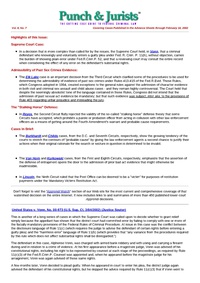United States v. Van Horn, 277 F.3d 48 (1st Cir. 2002) (Judge Lipez)
United States v. Kurkowski, No. 01-3071 (8th Cir. 03/05/02) (Judge Fagg)
The continued use by the Government of highly sophisticated string operations, particularly in drug cases, causes many defendants to consider raising the defense of entrapment …
Here a divided court held that questioning during the course of lawful custody need not be related to the reason for that custody so long as the questions do not otherwise make the custody itself unreasonable or unduly extend the custody.
United States v. Bookhardt, 277 F.3d 558 …
Here the Court held that a criminal defendant who knowingly and voluntarily enters a guilty plea under Fed. R. Crim. P. 11(h), without objection, carries the burden of showing plain-error under Fed.R.Crim.P. 52; and the court may look to the entire record.
This is another of a long …
In this case, the Second Circuit held that a parolee cannot win a motion for the suppression of drugs seized from his property by claiming that his probation officer had improperly colluded with drug agents in helping them uncover the evidence in violation of the warrant and probable cause …
In this case, the petitioner, a state prisoner acting pro se, sought relief from his convictions and sentences for rape and malicious wounding under 28 U.S.C. § 2254. The District Court, acting sua sponte, dismissed his petition for failure to comply with the one-year limitation period for bringing such …
Although this was a civil case, it is significant because it provides detailed guidance on how to determine the admissibility of past sex crimes evidence under Rules 413-415 of the Federal Rules of Evidence. Congress enacted those Rules in 1994 as part of the Violent Crime Control and Law …
Here the Court held that, even though the Mandatory Victim Restitution Act (18 USC § 3663A) defines a "victim" as a "person," the legislative history and case law show that the Post Office qualifies as a victim for purposes of restitution awards.
The defendant in this case, a …
In this case, after the five year statute of limitations for the Government to commence judicial forfeiture proceedings had expied (see 19 U.S.C. § 1621), the claimant, Gary Marolf, filed a motion for the return of his 55-foot sailing vessel pursuant to Rule 41(e) of the Fed.R.Crim.P. The district …
United States v. Bookhardt, 277 F.3d 558 (D.C. Cir. 2002) (Judge Garland)
United States v. Childs, 277 F.3d 947 (7th Cir. 2002) (En Banc) (Judge Easterbrook)
The holdings in both of these cases are strong reminders that winning appeals based on alleged violations of the Fourth Amendment becomes ever …
In this case, the defendant filed a motion to dismiss the government's appeal on the ground that the government had failed to file, in a timely fashion, the certification required by § 3731. That section provides, inter alia, that:
"An appeal by the United States shall lie to a …
United States v. Van Horn, 277 F.3d 48 (1st Cir. 2002) (Judge Lipez)
United States v. Kurkowski, No. 01-3071 (8th Cir. 03/05/02) (Judge Fagg)
The continued use by the Government of highly sophisticated string operations, particularly in drug cases, causes many defendants to consider raising the defense of entrapment …
